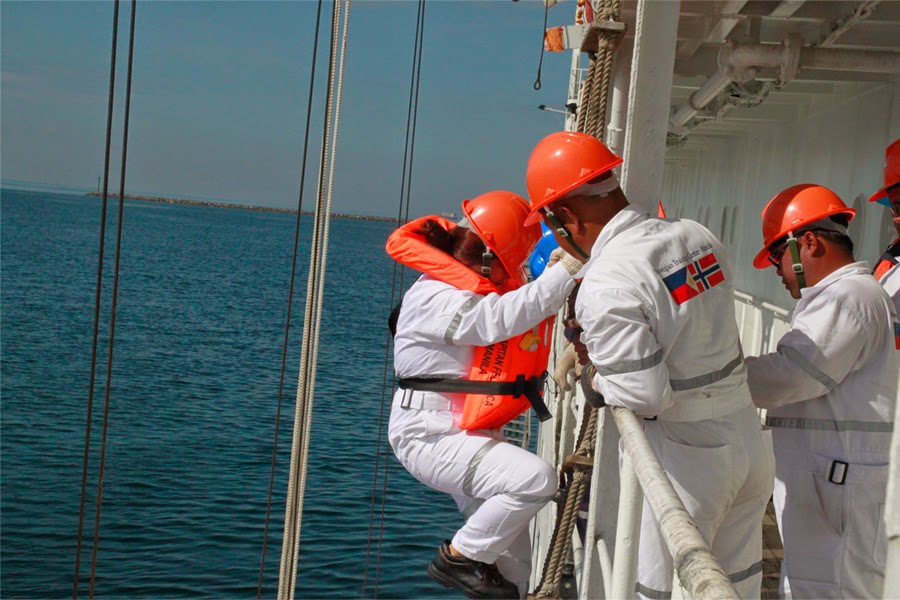Dare the Seaman's Job?
Seafaring will always be an interesting job for Filipinos. We have a very rich history of seafaring, where grandfather, father, son, relatives and friends cling to brave the jobs at sea; this is in fact a country of seafarers.
In my childhood, I grew up in a community where seafarers are refer to as a symbol of masculine dominance and potent power to sustain big and extended Filipino families. They leave the country for a year and you'll see their family status two notches higher every year.
Seeing just the astounding side of it from the rich neighborhood, I grew up believing that seafaring is an easy job with easy money.
Not until I work for the Norwegian Training Center-Manila.
SHIPBOARD FAMILIARIZATION IS AN EYE OPENER
For a day, I joined the cadets Shipboard Familiarization. It's an annual training to prepare the second year students under the NSA Philippines Cadet Program to life on-board, general safety and environmental protection and cultural awareness on shipboard discipline. It is also an avenue for graduating scholars to complete their lacking sea time to earn a degree in maritime.
Thought it will be pure fun, but the training was hard and broad, energy draining to the extent. I tried the rowing exercise but almost give-up going down and up of the wood and rope ladder that keeps on moving and entails danger on every step. I encountered one female cadet completing her lacking sea time. She maneuvered the boat around the ship under the brightest ray of sun, with all male counterparts rowing. I tried rowing too, but it was a lot harder than I thought. It looks easy as you see them rowing in perfect harmony but wait until you try it.
I was assisted and toured to the engine room, main machinery, bridge, control room, cabin, kitchen and almost all parts of the ships that are unknown to non-maritime personnel like me. I was in awe, there are lots of thing to learn, to try on, to master before a cadet can fully pass and earn their degree. And my five senses agreed that training is a serious business here.
Looking at the cadets sincerely doing the training, I can sense how passionate they are, as it translates to their unwavering physical and mental strength and dedication to learn. From there, anybody can say these cadets will succeed not only because they are part of the NSA Cadet Program but because they have reach that point of the program with sustained desire to finish and move forward; taking every single step to get closer to their dreams.
IT TAKES MORE THAN GUTS TO BE IN MARITIME
In my conversation with two female cadets; one on her 2nd year preparing for 3rd year sea time period and a 4th year completing her one month sea time, they shared a very interesting side of them. Both were inspired by a seafarer relative or immediate family member. They are fully aware of the risk, the training and the hard work that they have to surpass yet maritime education is still their first choice and what they have been to didn't waver their decision; never. It actually upbeat their spirits more to work fair and even with fellow male cadets. The younger cadet said she likes studying the boys, their actions and how they initially feel they are dominant over the girls. She then uses what she has learned to make herself equal and fit for the expectations. The other lady who made it farther shared her challenges on-board that she once feel intimated but was able to overcome it through positive attitude that all her senior officers now were once a cadet like her. It really takes more than guts to be in maritime especially for women. Both of them believe in their capability to fit and stay on top of the male dominated industry and they do not prefer special treatment, as they believe what male can do, they can do it better. Moreover, their sheer physical agility and endurance to take on and dare the seaman's job without gender discrimination is more to look up for. Bravo! They are an epitome of modern woman; confident, determined, self-sufficient and unfettered.
And the number of female joining the industry is on up-trend globally though actual percentage is believed to be at hovering 2% based on Maritime Women Global Leadership 2014: Book of Abstracts. The liberation of these women from social expectations is somehow very much acceptable this time in the Philippine setting compared to the Filipino perceptions 10 years back.
Leaving the KFO, I know it made me change the way I see seafarers and seafaring as a whole. I saw the other side of the profession, the part unknown to many. Seafaring therefore was never easy, it is challenging. Money is hard-earned and not what I used to think. And surviving into this career needs quality education, constant training and superb determination.




.JPG)
Comments
Post a Comment